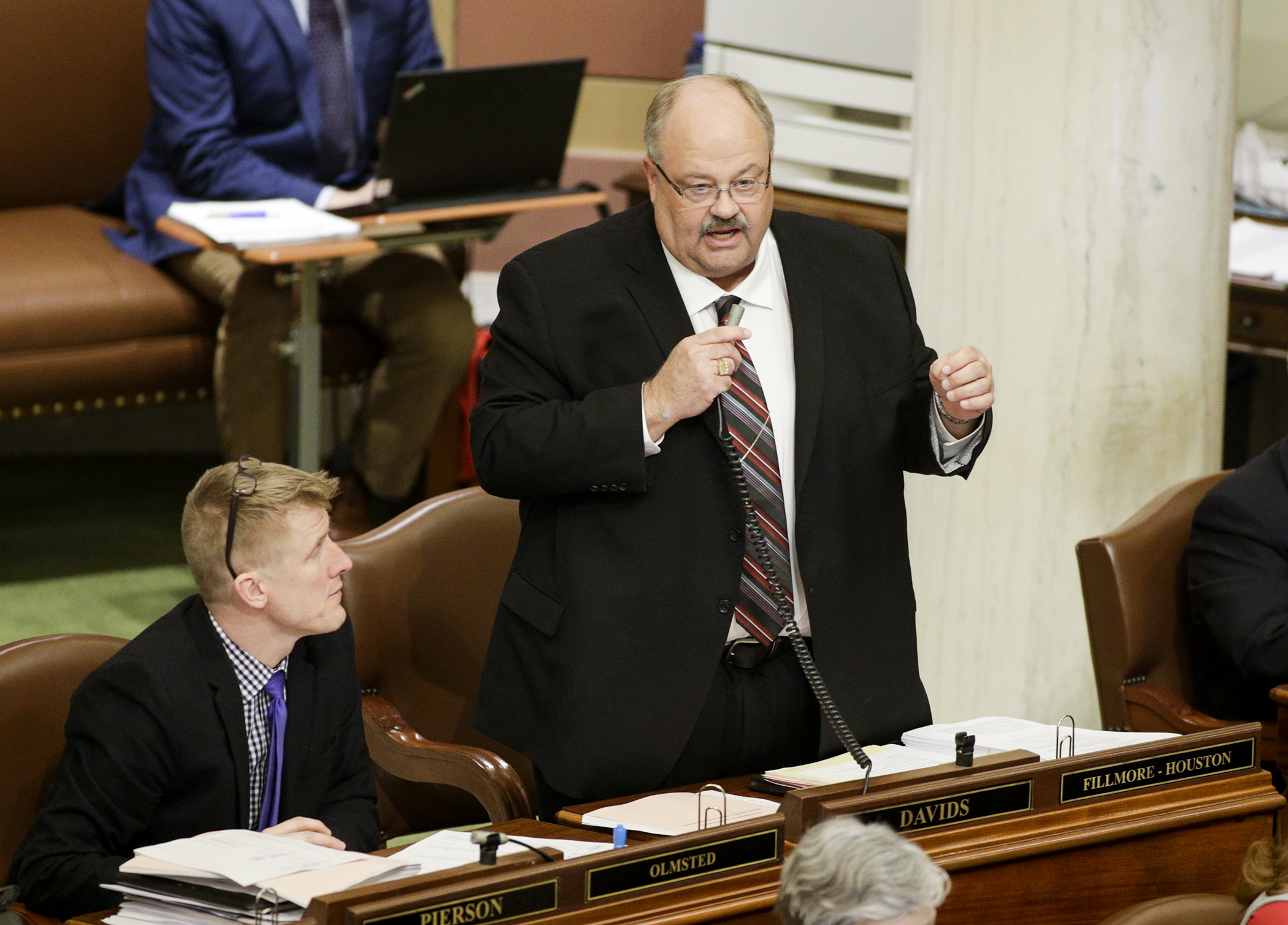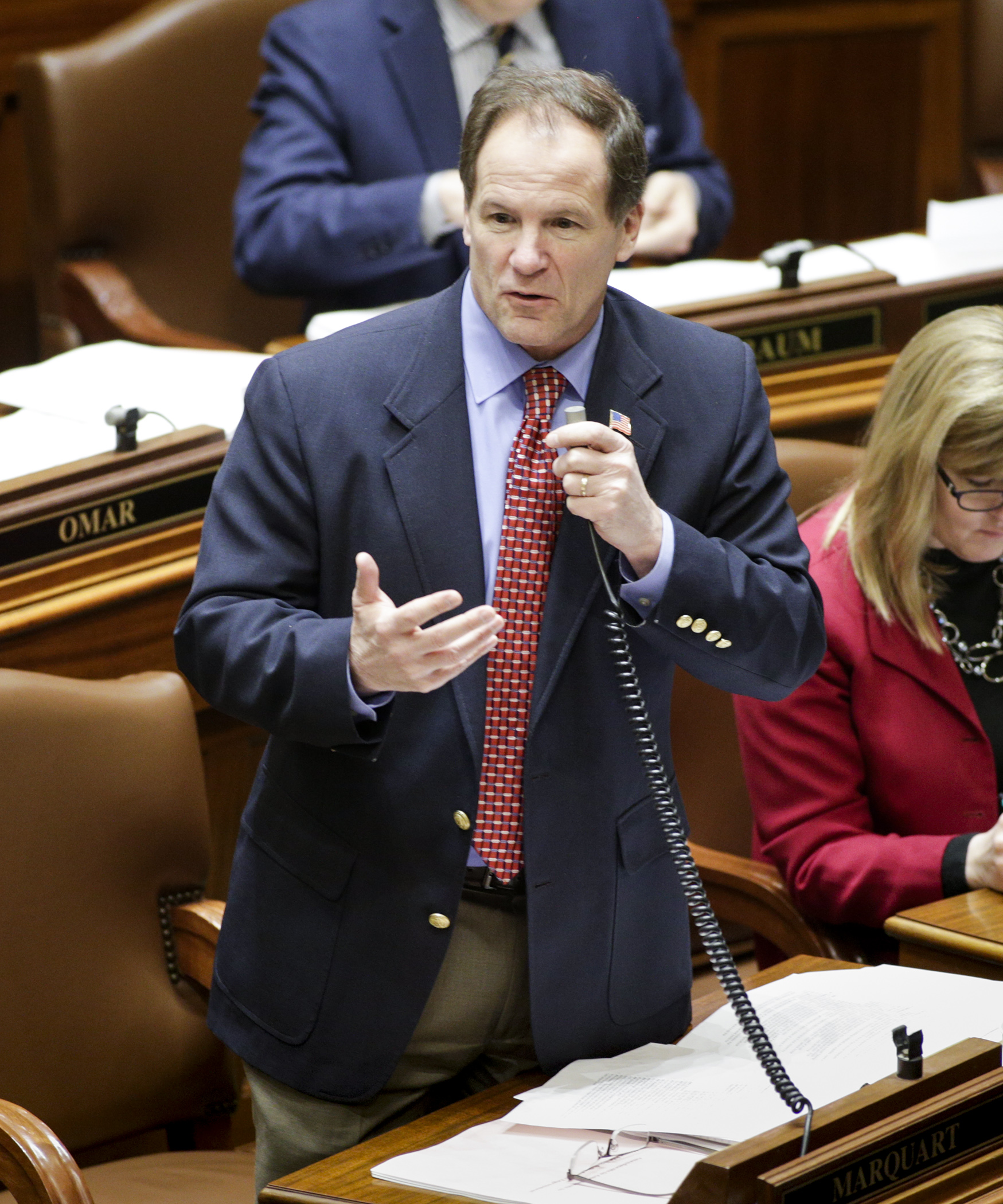Omnibus tax bill passes House amidst concern over its $5.2 billion size

Not since enactment of the state’s income tax fourth tier in 2013 has there been a comprehensive tax bill. With a projected $1.65 billion on the state’s bottom line, Rep. Greg Davids (R-Preston) is hoping that 2017 is the year for tax relief.
The House Taxes Committee chair sponsors HF4, the omnibus tax bill that was passed 80-52 by the House Thursday. It now moves to the Senate where Sen. Roger Chamberlain (R-Lino Lakes) is the sponsor.
“With a $1.65 billion budget surplus, it is clear state government has overcharged Minnesotans. … As lawmakers, it is our responsibility to come together and provide tax relief for the middle-class this year,” Davids said in a statement.
The bill proposes $1.35 billion in tax relief, including an increase to the income limit at which Social Security is taxable, refundable student loan payment and college savings plan credits, and expansion of the child dependent care credit.
 Rep. Paul Marquart offers an amendment to the omnibus tax bill during the March 30 floor session. Photo by Paul Battaglia
Rep. Paul Marquart offers an amendment to the omnibus tax bill during the March 30 floor session. Photo by Paul BattagliaBut DFLers contend that without an expanded working family credit, no inclusion of local government aid increases and the overall cost of the bill, the proposed relief would come at the expense of other areas of the state budget, and it weighs too heavy on the side of tax relief for businesses.
The minority caucus was unsuccessful in its attempt to “right size the bill” through an amendment from Rep. Paul Marquart (DFL-Dilworth) that would align the bill more to the governor’s tax priorities.
“The tax bill will set the stage for all the other bills that will be coming forward,” Marquart said. “The tax bill represents 80 percent of the budget [surplus]. It is out of balance with the priorities that have made our state strong and successful — that is a strong investment in education.” He said the Republican budget priorities are $5 in tax cuts for every $1 in education investment.
The only amendment adopted on the House Floor was from Rep. Chris Swedzinski (R-Ghent) to clarify the definition of aquaculture to allow for the state’s new shrimp industry.
Coming in at $5.2 billion
The House bill comes in at $5.2 billion over the 2018-19 biennium. This figure also includes shifts in sales tax collections and proposed aids and credits.
Included in the bill is the highly controversial Republican proposal to pay for a transportation funding package. It would designate $450 million of various vehicle-related fees and taxes to road and bridge projects, rather than have the money go into the state’s General Fund.
Other provisions include:
- $585 million in reduced individual income taxes;
- $205.3 million in changes to the state general levy;
- $161.7 million in changes to the estate tax;
- $97.1 million in reduced corporate franchise taxes;
- $92.9 million in sales and use tax reductions; and
- $16.2 million reduction in cigarette, tobacco and lawful gambling taxes.
New this year is a provision that would help first-time homebuyers by allowing for a subtraction up to $15,000 for married joint filers who save for a down payment in a special account.
Also making its debut is funding to compensate counties for property tax revenue lost to state land purchases. When land is purchased with money from two specific state funds, a county would receive a one-time payment equal to 30 times the property taxes assessed on that land before it was acquired. Annual payments would be withdrawn from the account for counties to reimburse their local governments for land-related services, such as maintenance work.W
WATCH Omnibus tax bill described on the House Floor
Sure to cause angst moving forward is a provision that would allow a refundable credit for a contribution to foundations that provide scholarships for non-public K-12 schools, make grants to charter schools or foundations that support public schools. The bill would make private school tuition eligible for the education tax credit at a $23 million biennial cost to the state’s General Fund.
Sales and use tax provisions
Under the bill, admissions to Minnesota State High School League events would no longer be subject to sales tax, and several nonprofit organizations would not have to collect sales tax on sponsored events.
Additionally, Super Bowl admissions and related events would see an exemption. The bill would also allow the Super Bowl Host Committee to purchase nonresidential parking for resale. Next year’s Super Bowl is scheduled to be played at U.S. Bank Stadium.
Also included is a $3.3 million sales tax exemption on materials used to build a proposed $150 million Minnesota United FC soccer stadium near the intersection of Interstate 94 and Snelling Avenue in St. Paul, as well as a permanent property tax exemption for the site.
Related Articles
Search Session Daily
Advanced Search OptionsPriority Dailies
Ways and Means Committee OKs proposed $512 million supplemental budget on party-line vote
By Mike Cook Meeting more needs or fiscal irresponsibility is one way to sum up the differences among the two parties on a supplemental spending package a year after a $72 billion state budg...
Meeting more needs or fiscal irresponsibility is one way to sum up the differences among the two parties on a supplemental spending package a year after a $72 billion state budg...
Minnesota’s projected budget surplus balloons to $3.7 billion, but fiscal pressure still looms
By Rob Hubbard Just as Minnesota has experienced a warmer winter than usual, so has the state’s budget outlook warmed over the past few months.
On Thursday, Minnesota Management and Budget...
Just as Minnesota has experienced a warmer winter than usual, so has the state’s budget outlook warmed over the past few months.
On Thursday, Minnesota Management and Budget...